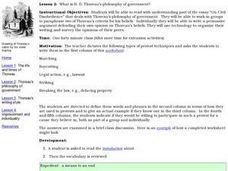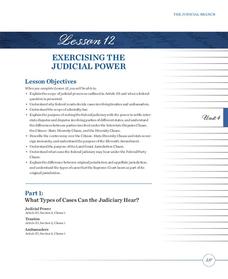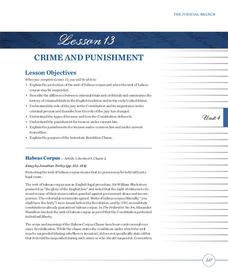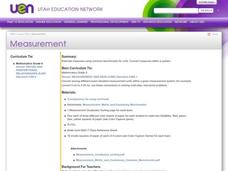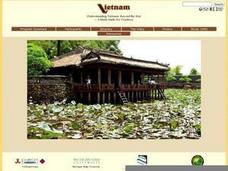Curated OER
H.D. Thoreau's Philosophy of Government
Students read an essay by H.D. Thoreau as analysis of his philosophy on government. In this Thoreau analysis lesson, students work in groups to paraphrase two of Thoreau's criteria for his beliefs about government. Students write a...
Curated OER
Greek Governments Comparison
In this World History activity, students compare and contrast five different Greek Government systems in a chart. They identify who ruled each type of government. In addition to, students list the characteristics and weaknesses of each...
Curated OER
I'm The Taxman!
Learners develop an understanding of how federal revenues are gained by taxes. This foundation enable students to decipher changes in federal tax policy. Groups of learners study different types of taxes and prepare presentations on each...
Curated OER
Which form of government?
Eleventh graders examine different forms of government. In this American Government lesson, 11th graders research a different government. Students create a poster board on the type of government.
Judicial Learning Center
State Courts vs. Federal Courts
Popular culture often portrays the Feds as the most fearsome of law enforcement agencies. Yet, someone charged with a crime is considerably more likely to end up in a state court. The lesson, one of six covering the Organization of the...
Judicial Learning Center
The Appeal Process
Why doesn't the Supreme Court hear testimony from witnesses? How do they complete an entire proceeding in less than two hours? A helpful lesson guides scholars of criminology through these and other questions by explaining how appeals...
Judicial Learning Center
About Federal Judges
Not just anybody can do the job of a federal judge, but according to the United States Constitution just about anybody can be appointed. The lesson outlines the process and requirements for becoming a federal judge, focusing on the...
Heritage Foundation
Exercising Judicial Power
We should all do more exercising, but should the judicial branch as well? High schoolers develop their understanding of what powers the judicial branch carries because of the US Constitution, as well as where their limits lie in the...
Judicial Learning Center
The Judge and the Jury
Unless you are a lawyer, you might not understand just how unrealistic Law and Order and other legal dramas actually are. Here's a great resource to help scholars of criminology gain a more realistic perspective. The lesson outlines the...
Heritage Foundation
Crime and Punishment
You wouldn't give someone a 10-day timeout for eating a piece of candy. The US government, too, does not believe in unreasonable punishment. A variety of exercises exploring the clauses of the US Constitution prompts class members to...
IBM
The Human Body
Every moment, the systems in your body are working together to keep you breathing, standing, and thinking. Elementary schoolers explore the human body and its systems with an impressive, 15-page lesson plan that should leave your...
Curated OER
Government Lesson Plans
Students can learn how their government is organized through these engaging lesson plans.
Curated OER
Government: The Power of Persuasion
Students are able to define and identify a type of interest group. They are able to describe some strategies used by interest group. Students are able to identify the postive and negative aspects of interest groups.
US Institute of Peace
Simulation on The Case of “Palmyra”
War-torn Palmyra needs your help! Young negotiators play the part of citizens of opposing countries through an eye-opening simulation. The fictional countries of Siwa and Nizwa stand at the brink of war, and your class' job is to create...
Curated OER
Judicial Branch & Supreme Court Questions
In this U. S. government worksheet, students respond to 19 short answer questions about the responsibilities of Supreme Court members in the United States.
Utah State Courts
Judges in the Classroom
Class members explore the process of a disposition hearing for juveniles, particularly looking at how the judge decides what sentence the juvenile offender should receive. Task your pupils with evaluating different sample cases provided...
Curated OER
Measurement
Learners explore the concept of measurement. In this measurement lesson, students discuss what specific measurement tools such as an odometer measure. Learners recite a measurement poem. Students make a foldable with conversion units...
Curated OER
Culture Sharing: History, Politics, Government
Students explore types of governments and political systems. In partners, students share information about their home country. Classmates work together to prepare a presentation about the history and government of a specific country.
Curated OER
A Brief History of Vietnam (1858-2004) and Its Evolving Communist System
Students examine the French colonization of Vietnam, the Vietnam War, and the current evolving Communist system. They develop political maps, outline the major events of the Vietnam War, write an essay, and compare/contrast democracy...
Curated OER
Political Systems
In this political systems worksheet, students discuss the type of society they would prefer, a class-less one regulated by democracy or a society with all levels of income and wealth, regulated by free market.
School Improvement in Maryland
Executive Order
After reading information about Executive Order #9066, class members assume the voice of an 18 year-old Japanese-American born in California and placed in an internment camp. Individuals then craft a letter to President Roosevelt...
Curated OER
Governmental Influence on the Construction of Dams
High schoolers comprehend how the type of government system affects the country's ability to change the environment by construction of large projects like dams. They explain how the type of government a country has can determine the...
Curated OER
Inflation and Money
Learners define money in terms of its functions and refer back to discussion of markets and the role of money in reducing transaction costs. They give examples of types of money.
Curated OER
Asia Crossword
In this geography instructional activity, students complete a crossword puzzle on the continent of Asia. They answer 21 questions related to the type of government systems found, capital cities, deepest lake, and lowest population density.


